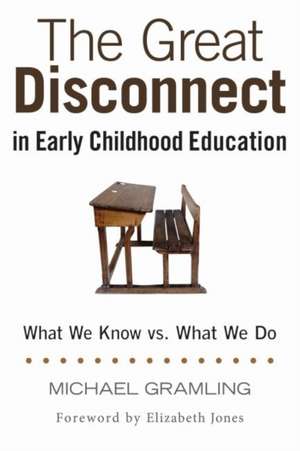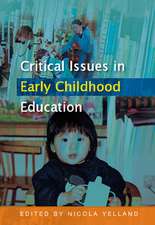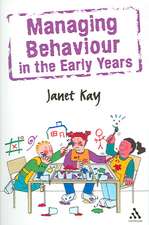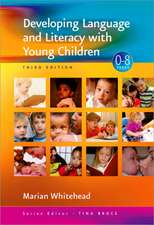The Great Disconnect in Early Childhood Education: What We Know vs. What We Do
Autor Michael Gramling Cuvânt înainte de Elizabeth Jonesen Limba Engleză Paperback – iun 2015
2015 INDIEFAB Award Finalist for Education
Early childhood educators need to be cognizant of the disconnect between public policy and classroom practice—the success of children they teach depends on it. This book analyzes how ineffective practices are driven by unexamined public policies and why educators need to challenge their thinking in order to make a difference in children's lives. A very complex story about public policy and the importance of teaching is told while entertaining and engaging the reader throughout.
Early childhood educators need to be cognizant of the disconnect between public policy and classroom practice—the success of children they teach depends on it. This book analyzes how ineffective practices are driven by unexamined public policies and why educators need to challenge their thinking in order to make a difference in children's lives. A very complex story about public policy and the importance of teaching is told while entertaining and engaging the reader throughout.
Preț: 152.53 lei
Nou
Puncte Express: 229
Preț estimativ în valută:
29.19€ • 30.36$ • 24.10£
29.19€ • 30.36$ • 24.10£
Carte disponibilă
Livrare economică 24 martie-07 aprilie
Preluare comenzi: 021 569.72.76
Specificații
ISBN-13: 9781605543994
ISBN-10: 1605543993
Pagini: 168
Dimensiuni: 152 x 229 x 15 mm
Greutate: 0.32 kg
Editura: Redleaf Press
Colecția Redleaf Press
ISBN-10: 1605543993
Pagini: 168
Dimensiuni: 152 x 229 x 15 mm
Greutate: 0.32 kg
Editura: Redleaf Press
Colecția Redleaf Press
Recenzii
"Head Start promised to break the cycle of poverty. Has it succeeded? No, says Michael Gramling—but it could. In this provocative, inspiring history he shares his vision of an adult-child community of co-learners—a developmentally appropriate early childhood program built on individual children’s strengths to ensure that they really do learn. With Michael as your storyteller, you will discover what shared learning really looks like."—Elizabeth Jones, Faculty emerita, Pacific Oaks College; author, Emergent Curriculum; The Play’s the Thing
"This book takes a refreshing approach to understanding the development of young children as active learners. The book provides real-life stories and discusses the every-day challenges of the interaction between theory and practice when communicating with young children. Those who read the book will undoubtedly reflect upon their own parenting, teaching, and impact on young children. It is a delightful, informative read!"—Linda Flynn, PhD, Professor in Early Intervention at the University of New Orleans
For those of us who believe in the Head Start vision and mission, an analytical examination of our progress and accomplishments is difficult and even frightening. Michal Gramling has provided us with a context and framework to engage in the hard thinking that Head Start deserves. His use of real-life examples and stories give both substance and reality to his claim that we have strayed from doing that which we know is right and necessary for America’s most vulnerable young children. This book will require early educators and policy makers to take a deep breath as they ponder the future of early intervention efforts.—Marce Verzano O'Brien
The Great Disconnect in Early Childhood Education presents a new approach for early childhood educators who may know much about how children learn, but less about how that connects to classroom choices. With a system that advocates rote learning, young children are less encouraged to use play and exploration as learning devices: this book identifies the problems, provides a history of how this educational focus came to be, and, most importantly, uses real-life examines to show how to improve communication with young children. Highly recommended.—James Cox, The Education Shelf: CA Bookwatch
Notă biografică
Michael Gramling: Michael Gramling is an expert in providing family literacy training and positive guidance training and has conducted experiential supervisor/mentor coach institutes for Head Start programs throughout the US. Michael also teaches a community parenting class for distressed families who are involved in custody disputes or have been ordered by the court system to seek training and support for their parenting skills. Michael earned his master's degree in human development from Pacific Oaks College.
Elizabeth Jones: Elizabeth Jones is faculty emerita, School of Human Development and Family Studies, Pacific Oaks College, in Pasadena, California.
Elizabeth Jones: Elizabeth Jones is faculty emerita, School of Human Development and Family Studies, Pacific Oaks College, in Pasadena, California.
Descriere
Examines the disconnect between public policy and classroom practice—and what educators need to change in order to teach children well.











